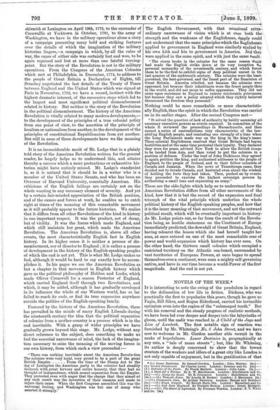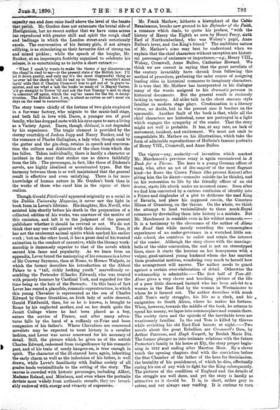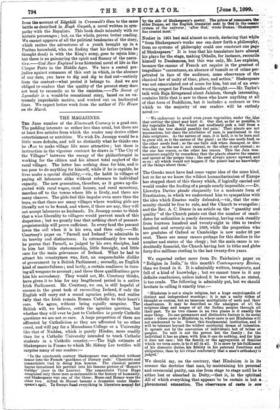NOVELS OF THE WEEK.* IT is interesting to note the
swing of the pendulum in regard to the delineation of low life in fiction. Dickens, who was practically the first to popularise this genre, though he gave us Fagin, Bill Sikes, and Rogue Riderhood, carried his invincible optimism even into the region of the " submerged tenth." But with his removal and the steady progress of realistic methods, we have been led ever deeper and deeper into the labyrinths of gloom, until the nadir was reached in A Child of the Jago and Liza of Lambeth. The first notable sign of reaction was furnished by Mr. Whiteing's No. 5 John Street, and we have now to welcome in Mr. Gordon another able recruit in the ranks of hopefulness. Lesser Destinies is, geographically at any rate, a "tale of mean streets " ; but, like Mr. Whiteing, its author is deeply concerned to show that the lowest stratum of the workers and idlers of a great city like London is not only capable of enjoyment, but in the gratification of that (1.) Lesser Destinies. By Samuel Gordon, London : John Murray. [68 (2.) Geraki FitaGerald. By Charles Lever. London Downey and Co. NM— (S.) Defender of the Faith. By Frank Mathew. London : John Lane. [6s.1— (4.) A Dash for a Throne. ByA. W. Marchmont. London : Hutchinson and Co. (63.)—(5.) Along the Road. By E. Constance. London : Hutchinson and Co. [68.]—(&) Toni-all-Alone. By Amelia M. Barker! London : J. Macqueen. [68.] —(7.) OrnmwelVa Own. By Arthur Paterson. London : Harper and Brothers. [88.1—(3.) Hugh Owyeth. By Beulah Marie Dbi_ London : Macmillan and Co. (61)—(9.) God Save 'Vivian& By Frederic Breton. London : Grant Richards. [62.1—(l0.) The Secret of Lynndale. By Florence Warden. London : F. V. White
and Oa. teal
capacity can and does raise itself above the level of the beasts that perish. Mr. Gordon does not extenuate the brutal side of Hooliganism, but no recent author that we have come across has reproduced with greater skill and spirit the rough chaff and badinage in which the London street-arab 'notoriously excels. The conversation of his &deli girls, if not always edifying,. is as stimulating as their favourite diet of 'strong tea and- mixed ' pickles ; while the speech of the btirglar, Mr.
Bunker, at an impromptu festivity organised to celebrate his release, is so entertaining as to invite a short extract:— • " What I speshly, wants to make the theMe o' my discourse—as the "chapria used to say—is the present state o' the British law. I'll let it down gently, and only say it's the most disgraceful thing as 'as ever 'ad the cheek to 'old its 'ead up in 'istory. I wouldn't mind layin' odds that if Charley Cromwell was to get out of 'is grave to- morrer, and see what a 'ash the beaks 'as made of 'is Magny Carter, 'e'd go straight to Tower 'ill and ask the fist Tommy 'e met to chop 'is cokernut off again, which the reg'lar name for the biz. is decap- tivation. The British law, I sez, is about as rotten as cat's meat six days on: the road to resurrection."
The story treats chiefly of the fortune of two girls employed in a fur-wear factory, who migrate to the music-hall stage, and both fall in love with Deere, a younger son of good family, who has dropped caste with his eyes open to earn a living as a Variety Agent. Deere, though déclassé, is not degraded by his experience. The tragic element is provided by the stormy courtship of Joshua Jupp and Nancy Bunker, and by the romance of Phcebe Gallaghan, a lady who, though sunk to the gutter and the gin-shop, retains in speech and conversa- tion the culture and distinction of the class from which she has fallen. Taken individually, there is hardly a character or incident .in the story, that strikes one as drawn faithfully from the life. The personages, in fact, like those of Dickens's novels, are highly idealised or accentuated types. But the harmony between them is so well maintained that the general result is effective and even satisfying. There is far more knowledge of human nature in Mr. Gordon's book than in the works of those who excel him in the rigour of "their realism Though: GeraldEitzGerakl appeared originally as a serial in the Dublin- University Magazine? it never saw the light in book form.in Levees lifetime. • His daughter, Mrs. Nevill, who assisted him:shortly before his death in the preparation of a collected, editkut of. his works, was unaware of the motive of this omission; and left it to the judgment of the present publishers whetherit should be revived or not. We do not think that any-one will quarrel with their decision. True, it has not the exuberant animal spirits which marked his earlier work ; butoa_the other hand, it has a great deal of his wonted animation. in the, conduct of narrative, while the literary work- manship, is immensely superior to that of the novels which earned him _fame and popularity. As we learn from an appendix, Lever found the mainspring of his romance in a letter of Sir Conway Seymour, then at Rome, to Horace Walpole, in which the former describes his introduction at the' Abbezi Palace to a " tall, sickly looking youth" marvellously re- sembling the Pretender (Charles Edward), who. was treated with princely honours by Cardinal York, and regarded for the time being as the heir of the Stewarts. On this basis of fact Lever has reared a plausible, romantic superstructure, in which this young. Chevalier is represented as the son of Charles Edward by Grace Geraldine, an Irish lady of noble descent, Gerald FitzGlerald, then; for so he is known, is brought to Rome by his neglected mother, and on her death quits the Jesuit College where he had been placed as a boy, enters the service of France, and after many adven- tures falls by the hand of a ruffianly ex-Friar and boon companion of his father's. Where Chevaliers are concerned novelists may be expected to treat history in a cavalier fashion, and Lever was never renowned for his accuracy of detail.: Still, the picture which, he gives us , of the sottish Charles Edward, redeemed from insignificance by his romantic past, and of his train of needy hangers-on, is true enough in spirit. The character of the ill-starred hero, again, inheriting the early charm as well as the indecision of his father, is well drawn, while Lever's familiarity with Italian society of all grades lends verisimilitude to the setting of the story. The canvas is crowded with historic personages, including Alfieri, Madame Roland, and Mimbeau, and even where the portraits deviate most 'widely.frorh authentic records, they are invari- ably endowed With energy-and vivacity of expression.' Mr. Frank Mathew,' hitherto a hierophant of the Celtic Renaissance, breaks new ground in his. Defender of the Faith, a romance which deals, to quote his preface, "with the history of Henry the Eighth as seen by Henry Percy, sixth Earl of Northumberland, who was Wolsey's pupil, Anne Bnllen's lover, and the King's friend." The ambitious nature of Mr. Mathew's aims may best be understood when we explain that the chief characters without exception are histori- cal personages of eminence or importance,—e.g:, Henry VIII., Wolsey, Croniwell, Anne Bullen, Catherine Howard. We think we are correct in saying that the great novelists of the century. invariably have shrunk from following, this method of procedure, preferring the safer course of assigning leading itles in historical romances to imaginary characters. It is true that Mr..Mathew has incorporated ,in his dialogue many of the words assigned to his dramatis persona in historical documents.. But the general result is curiously lacking in variety. All alike talk in the short staccato style familiar in modern stage plays. Condensation is a literary virtue, no doubt, but in the present case it borders on the spasmodic. Another fault of the book is that, while all the chief characters are historical, none are portrayed in a light which engages the sympathy of the reader. That the story might act well is probable. It has, at any rate, no, lack of movement; incident, and excitement. We must not omit to congratidate Mr. Mathew on his illustrations, which take the form of admirable reproductions of Holbein's famous portraits of Henry VIII., Cromwell, and Anne Millen.
The vigour—nay, audacity—of invention which marked Mr. Marchmont's previous essay is again encountered in A Dash for a Throne. The hero is a young German officer, of rank, who, after an act of lese-majesti of the most flagrant kind—he floors the Crown Prince (the present Kaiser) after giving him the lie direct—commits suicide (as he thinks), and on his restoration to life by the friendly offices of an old doctor, starts life afresh under an assumed name. Soon after we find him converted by a curious confusion of identity into • a Prince and ringleader of a plot to dethrone the mad King of Bavaria, and place his supposed cousin,. the Countess Minna of Gramberg, on the throne. On the whole, we think the attempt to .lend verisimilitude verisimilitude to these mock:Royal romances by dovetailing them into history is a mistake. . But , Mr. Marchmont .is readable even in his wildest moments.— , , It is a testimony to the cleverness of the author -of7Alfing the Road that while merely recording the commonplace experiences of , an under-governess in a wretched, little sea- side school, she contrives to enlist and retain the interest of the reader. Although the story closes with the marriage- bells of the older convention, the gnd is not on stereotyped lines, since it starts the heroine on her honeymoon with a vulgar, good-natured young husband whom she has married from prudential motives, wondering very much to herself how the arrangement will answer. The author needs to guard against a certain over-elaboration. of detail. Otherwise the workmanship is admirable.—The first half of Tom-All- Alone gives a very clever and touching picture of the life of a poor little disowned bastard who has been sub-let to a woman in the East End by the woman in Westminster to whom he is farmed out. The author describes with much skill Tom's early struggles, his life as a clerk, and •his , emigration to South Africa, where he makes his fortune. When, however, towards the middle of the book, he returns to spend his money, we lapse into commonplace and remain there. The society siren and the episode of the inevitable lover are wearisomely familiar. In the end Tom is killed by thieves while revisiting his old East-End haunts at night.—Two novels about the great Rebellion are Cromwell's Own, by Arthur Paterson, and Hugh Gwyeth, by Beulah Marie Dix. The former plunges us into intimate relations with the future Protector's family in his house at Ely, the story proper begin- ning in 1642 and ending after Marston Moor. By a clever touch the opening chapters deal with the conviction before the Star Chamber of the father of the hero for Socinianism. the brutality of his punishment, of which he dies, effectually curing his-son of any wish to fight for the King subsequently. The pictures of the condition of England and the details of the struggle are well done, and yet the story is hardly as attractive as it should be. It is, in short, rather grey in colour, and not always easy reading. It is curious to turn from the account of Edgehill in Cromwell's Own to the same battle as described in Hugh Gwyeth, a novel written in sym- pathy with the Royalists. This book deals minutely with no historic personages ; but, on the whole, proves better reading. We cannot approve of all the political tendencies of the story, which recites the adventures of a youth brought up in a Puritan household, who, on finding that his father (whom he thought dead) is with the King's army, goes to rejoin him ; but there is no gainsaying the spirit and fluency of the narra- tive.—God Save England is an historical novel of life in the Cinque Ports in the Middle Ages. We have a rooted pre- judice against romances of this sort in which, in the absence of any date, you have to dig and dig to find out—entirely from the context—what period it belongs to. And we are obliged to confess that the quality of the present story does not tend to reconcile us to the omission.—The Secret of Lynndale is a would-be sensational story, based on an ex- tremely improbable motive, and worked out on hackneyed lines. We expect better work from the author of The House on the Marsh.








































 Previous page
Previous page